After the Bridge on River Kwai, it was finally time for the much awaited visit to the famous Tiger Temple. After Poom purchased the tickets, we rather gingerly signed the indemnity (?!) form, quickly forgot all about it and cheerfully walked in a large forest area, with lots of trees and deer roaming around at ease.
To our left was a huge cage which housed some beautiful birds. Walking further, we saw a pond with wild buffaloes swimming and besides that was a cage with two beastly looking bears. Having seen the beautiful, colourful temples in Bangkok, I kept on wondering how further inside the real temple was. Upon asking, Poom said that the forest area was considered as the Temple and there was no specific chamber for the Gods.
-

We loved getting to know this deer better
-
%22%20transform%3D%22translate(.6%20.6)%20scale(1.26563)%22%20fill-opacity%3D%22.5%22%3E%3Cellipse%20fill%3D%22%236f6f6f%22%20rx%3D%221%22%20ry%3D%221%22%20transform%3D%22rotate(179.5%2057.7%2045.6)%20scale(42.1182%2068.00216)%22%2F%3E%3Cellipse%20fill%3D%22%23969696%22%20rx%3D%221%22%20ry%3D%221%22%20transform%3D%22matrix(35.13228%202.38873%20-4.50177%2066.20974%20114.8%20249.9)%22%2F%3E%3Cellipse%20fill%3D%22%23fff%22%20cx%3D%22255%22%20cy%3D%22139%22%20rx%3D%22117%22%20ry%3D%22117%22%2F%3E%3Cellipse%20fill%3D%22%23fff%22%20cy%3D%22173%22%20rx%3D%2284%22%20ry%3D%2284%22%2F%3E%3C%2Fg%3E%3C%2Fsvg%3E)
A sad looking bear
-
%27%20fill-opacity%3D%27.5%27%3E%3Cellipse%20fill%3D%22%23a64427%22%20fill-opacity%3D%22.5%22%20rx%3D%221%22%20ry%3D%221%22%20transform%3D%22rotate(-95.9%20199%20-107.5)%20scale(86.26416%20140.66533)%22%2F%3E%3Cellipse%20fill%3D%22%231c3900%22%20fill-opacity%3D%22.5%22%20rx%3D%221%22%20ry%3D%221%22%20transform%3D%22rotate(174.4%2058.7%2074.5)%20scale(77.87117%2034.09704)%22%2F%3E%3Cellipse%20fill%3D%22%231a3600%22%20fill-opacity%3D%22.5%22%20rx%3D%221%22%20ry%3D%221%22%20transform%3D%22rotate(66.7%2012.1%20403.3)%20scale(39.11246%2087.46445)%22%2F%3E%3Cellipse%20fill%3D%22%23588800%22%20fill-opacity%3D%22.5%22%20rx%3D%221%22%20ry%3D%221%22%20transform%3D%22matrix(17.21612%2070.42615%20-148.63422%2036.3346%20121.8%20263.3)%22%2F%3E%3C%2Fg%3E%3C%2Fsvg%3E)
Wild buffalo beating the heat in a pond
-
%27%20fill-opacity%3D%27.5%27%3E%3Cellipse%20fill%3D%22%23001e42%22%20fill-opacity%3D%22.5%22%20rx%3D%221%22%20ry%3D%221%22%20transform%3D%22matrix(-106.06312%2088.60239%20-54.0267%20-64.67366%2090.7%20231.4)%22%2F%3E%3Cpath%20fill%3D%22%23de7d2a%22%20fill-opacity%3D%22.5%22%20d%3D%22M225.4%20121.6L104.3%208.6%20198-91.9%20319.2%2021z%22%2F%3E%3Cellipse%20fill%3D%22%23004388%22%20fill-opacity%3D%22.5%22%20rx%3D%221%22%20ry%3D%221%22%20transform%3D%22matrix(-39.48756%2029.02515%20-34.84154%20-47.40053%20149.4%20224)%22%2F%3E%3Cellipse%20fill%3D%22%23919a9b%22%20fill-opacity%3D%22.5%22%20rx%3D%221%22%20ry%3D%221%22%20transform%3D%22matrix(-20.31131%20-50.7819%2025.5136%20-10.2047%20297%20100.3)%22%2F%3E%3C%2Fg%3E%3C%2Fsvg%3E)
Err .. what bird was it ?
Wat Pha Luang Ta Bua, or the Tiger Temple was established in 1994 as a forest monastery and sanctuary for wild animals. In 1999, the temple got its first tiger cub. With time, many more tiger cubs were given to the temple, usually orphans, and many more were born in the temple. Today, there are more than 120 tigers in the temple and it is perhaps the largest single concentration of tigers in the world. The species of tigers which live inside the temple premises include Royal Bengal, Indochinese and Malayan tigers. The temple targets building a larger sanctuary which will give a natural habitat for the tigers.
Just ahead of us we now saw the gigantic tigers playing with a monk. People were queuing up to walk them and get a picture. But first, we were explained some ground rules. Our clothes had to be of pastel shades and bright colours were not allowed. We were supposed to walk behind the tigers and give our cameras to the temple staff who would click a picture for us from the front. Rather Mechanically but still excited, we walked with the Tigers which was indeed a different experience.
So around half a kilometre ahead there is a place where all tigers can be unchained, rested and play. After all tigers were walked down, the volunteers at the temple shared some information about the temple, how they have rescued the animals, and how they intend to introduce these tigers back into the nature. We wondered, why on seeing so many people they just didn’t pounce on to us. But we were informed that these tigers are fed cooked meat and hence raw meat doesn’t seem like food to them. Over and above that, most of the tigers have been within the temple and hence they have always known men to be their friends. An example of this friend we saw, a monk playing with the tigers just like someone played with their children.
-
%22%20transform%3D%22translate(.8%20.8)%20scale(1.5625)%22%20fill-opacity%3D%22.5%22%3E%3Cellipse%20fill%3D%22%23f9c092%22%20rx%3D%221%22%20ry%3D%221%22%20transform%3D%22matrix(-18.28184%2034.06829%20-50.04105%20-26.8532%20229.5%20144.1)%22%2F%3E%3Cellipse%20fill%3D%22%234c1300%22%20rx%3D%221%22%20ry%3D%221%22%20transform%3D%22matrix(25.51525%207.05496%20-16.2898%2058.91438%201%2034)%22%2F%3E%3Cellipse%20fill%3D%22%23bf8659%22%20rx%3D%221%22%20ry%3D%221%22%20transform%3D%22matrix(3.76422%2022.54977%20-125.11846%2020.88594%20179.3%20104.1)%22%2F%3E%3Cellipse%20fill%3D%22%23773e11%22%20cx%3D%2270%22%20cy%3D%22164%22%20rx%3D%22104%22%20ry%3D%2227%22%2F%3E%3C%2Fg%3E%3C%2Fsvg%3E)
Play Time
-
%22%20transform%3D%22translate(.8%20.8)%20scale(1.5625)%22%20fill-opacity%3D%22.5%22%3E%3Cellipse%20fill%3D%22%23ffd7b0%22%20rx%3D%221%22%20ry%3D%221%22%20transform%3D%22matrix(-38.03606%2018.59054%20-111.97494%20-229.09957%2031%20137.5)%22%2F%3E%3Cellipse%20fill%3D%22%237d460d%22%20cx%3D%22160%22%20cy%3D%2233%22%20rx%3D%22100%22%20ry%3D%22100%22%2F%3E%3Cellipse%20fill%3D%22%23f2b58b%22%20rx%3D%221%22%20ry%3D%221%22%20transform%3D%22matrix(1.71411%20-23.3763%20170.30112%2012.48768%20147.8%20163.7)%22%2F%3E%3Cellipse%20fill%3D%22%23c2903a%22%20rx%3D%221%22%20ry%3D%221%22%20transform%3D%22matrix(20.36519%20-22.239%2078.52372%2071.9075%20179%2026.4)%22%2F%3E%3C%2Fg%3E%3C%2Fsvg%3E)
Show me your teeth
-
%27%20fill-opacity%3D%27.5%27%3E%3Cellipse%20fill%3D%22%23fff7b7%22%20fill-opacity%3D%22.5%22%20rx%3D%221%22%20ry%3D%221%22%20transform%3D%22rotate(-95.5%20265.3%20-34.6)%20scale(49.86117%20395.73891)%22%2F%3E%3Cellipse%20fill%3D%22%23542000%22%20fill-opacity%3D%22.5%22%20rx%3D%221%22%20ry%3D%221%22%20transform%3D%22matrix(-209.30502%20-20.03375%207.06574%20-73.82018%2057.3%20106.4)%22%2F%3E%3Cellipse%20fill%3D%22%230a2d28%22%20fill-opacity%3D%22.5%22%20rx%3D%221%22%20ry%3D%221%22%20transform%3D%22matrix(-1.25733%20-51.44677%20141.0818%20-3.44796%20330.6%2038.6)%22%2F%3E%3Cpath%20fill%3D%22%23516a88%22%20fill-opacity%3D%22.5%22%20d%3D%22M261.4-61.5L268%2061.8%205.8%2075.5-.7-47.7z%22%2F%3E%3C%2Fg%3E%3C%2Fsvg%3E)
Feeding Time
-
%27%20fill-opacity%3D%27.5%27%3E%3Cellipse%20fill%3D%22%23552000%22%20fill-opacity%3D%22.5%22%20rx%3D%221%22%20ry%3D%221%22%20transform%3D%22matrix(-42.72423%2096.6513%20-119.76643%20-52.94216%2066%20104.7)%22%2F%3E%3Cellipse%20fill%3D%22%23fbc093%22%20fill-opacity%3D%22.5%22%20rx%3D%221%22%20ry%3D%221%22%20transform%3D%22matrix(68.60201%20131.60768%20-55.6851%2029.0265%20379.1%20164.9)%22%2F%3E%3Cellipse%20fill%3D%22%23e8ae81%22%20fill-opacity%3D%22.5%22%20rx%3D%221%22%20ry%3D%221%22%20transform%3D%22rotate(80.9%20-107.6%20186.6)%20scale(42.56891%20166.62209)%22%2F%3E%3Cellipse%20fill%3D%22%23001500%22%20fill-opacity%3D%22.5%22%20rx%3D%221%22%20ry%3D%221%22%20transform%3D%22matrix(12.782%2017.78804%20-31.80774%2022.85618%2017.8%2013.9)%22%2F%3E%3C%2Fg%3E%3C%2Fsvg%3E)
Monk Playing with Tiger
-
%27%20fill-opacity%3D%27.5%27%3E%3Cellipse%20fill%3D%22%23c8d4c0%22%20fill-opacity%3D%22.5%22%20rx%3D%221%22%20ry%3D%221%22%20transform%3D%22matrix(60.87388%20-273.72762%20108.43059%2024.11372%2046.7%2052.5)%22%2F%3E%3Cellipse%20fill%3D%22%23163211%22%20fill-opacity%3D%22.5%22%20rx%3D%221%22%20ry%3D%221%22%20transform%3D%22matrix(-2.2532%20-35.82064%20173.957%20-10.9423%20367.4%2015)%22%2F%3E%3Cellipse%20fill%3D%22%23934e15%22%20fill-opacity%3D%22.5%22%20rx%3D%221%22%20ry%3D%221%22%20transform%3D%22matrix(-19.14121%2056.982%20-180.67337%20-60.69123%20291.2%20189.3)%22%2F%3E%3Cellipse%20fill%3D%22%233b701c%22%20fill-opacity%3D%22.5%22%20rx%3D%221%22%20ry%3D%221%22%20transform%3D%22matrix(-46.15064%2018.8553%20-21.90642%20-53.6186%20379%20192.7)%22%2F%3E%3C%2Fg%3E%3C%2Fsvg%3E)
Monk sitting with a Tiger on his lap
-
%27%20fill-opacity%3D%27.5%27%3E%3Cpath%20fill%3D%22%23512600%22%20fill-opacity%3D%22.5%22%20d%3D%22M308.5%20203.3l-141.8%2010-17.4-249.4%20141.8-10z%22%2F%3E%3Cellipse%20fill%3D%22%23c38f60%22%20fill-opacity%3D%22.5%22%20rx%3D%221%22%20ry%3D%221%22%20transform%3D%22matrix(30.6437%20-2.97681%2027.73644%20285.52233%2020.5%20162.2)%22%2F%3E%3Cpath%20fill%3D%22%23ca8e62%22%20fill-opacity%3D%22.5%22%20d%3D%22M268%20255.5l136%2029.7%2020.2-137.5z%22%2F%3E%3Cellipse%20fill%3D%22%23ca8e62%22%20fill-opacity%3D%22.5%22%20rx%3D%221%22%20ry%3D%221%22%20transform%3D%22rotate(100.1%2033.2%2070)%20scale(55.40637%2037.48644)%22%2F%3E%3C%2Fg%3E%3C%2Fsvg%3E)
Seems the tigers did not mind monks sitting on them
There was a second round of photo session, where one could pose with the tigers. For some extra bucks, one could take their head in their lap or even play games with them like throw and fetch. However exciting it seemed, tigers didn’t seem to be the ferocious beast we have always imaged them to be and seeing them play like tamed dogs just felt a little sad.
After a short walk around the area and feeding some cubs and deer, we finally started our journey to a beautiful waterfall and river camp, but before we come to that, my fondest memory from this trip to the Tiger Temple:
This trip to Kanchanaburi and the Tiger Temple was courtesy the Tourism Authority of Thailand (TAT).

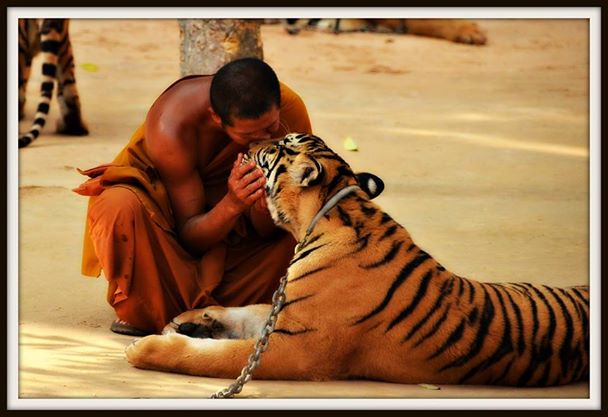
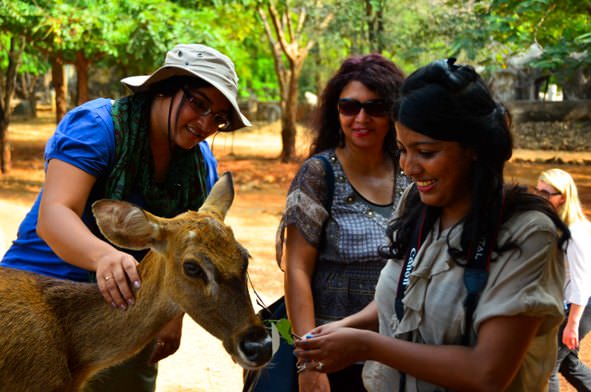
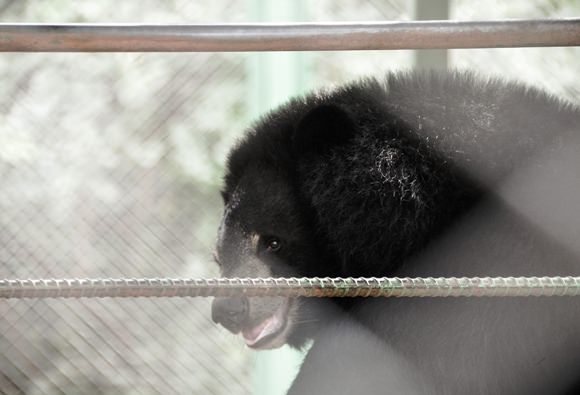
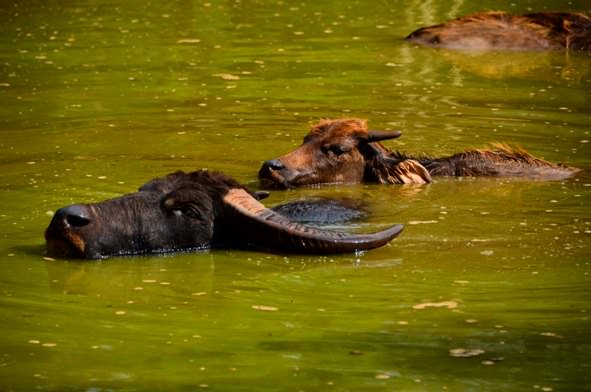
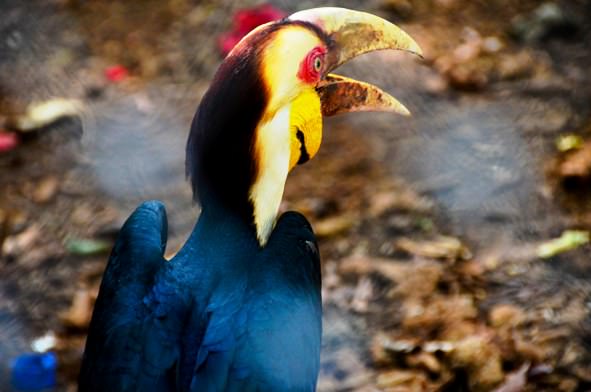
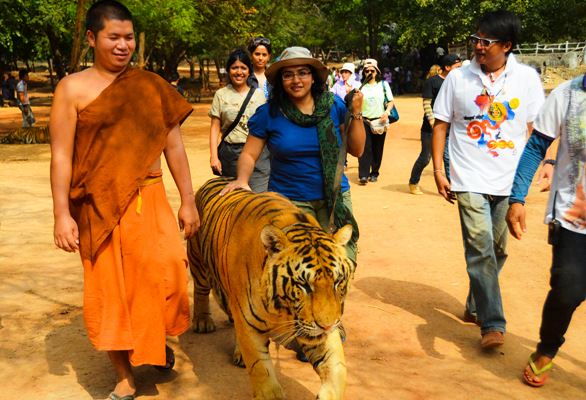
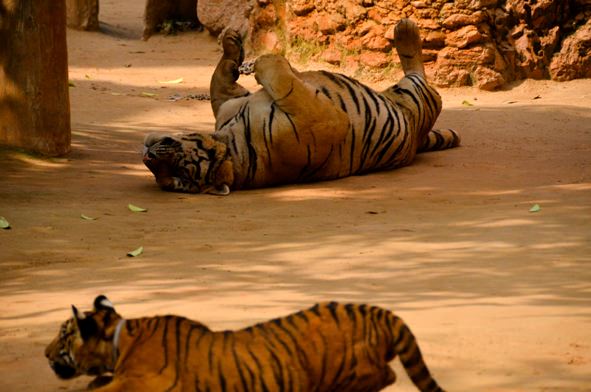
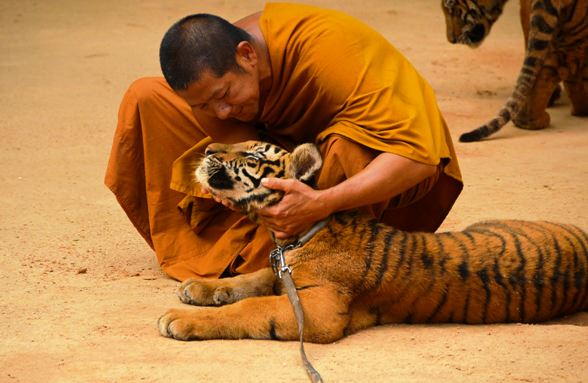
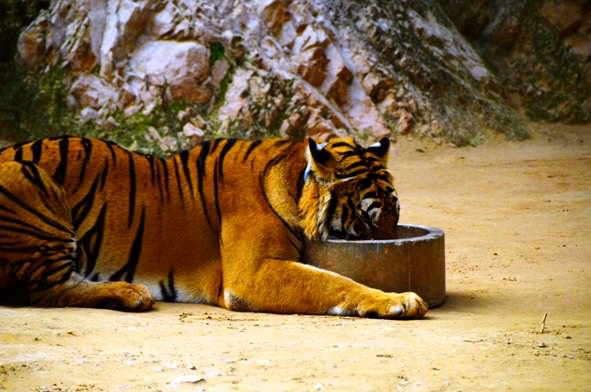
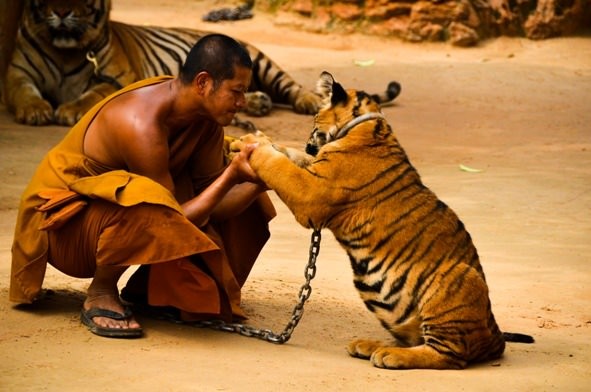
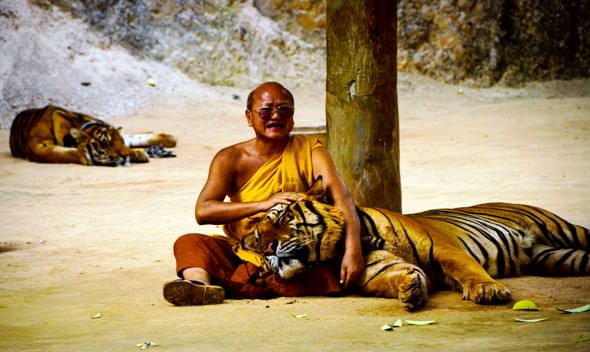
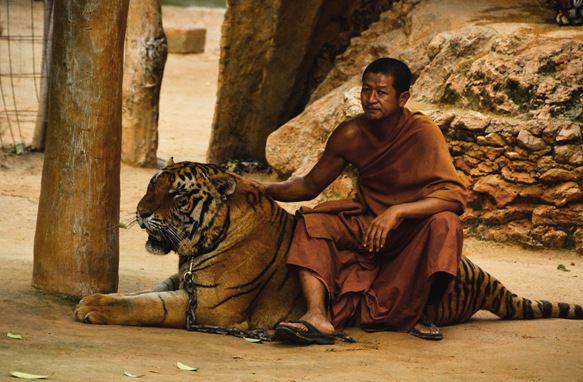
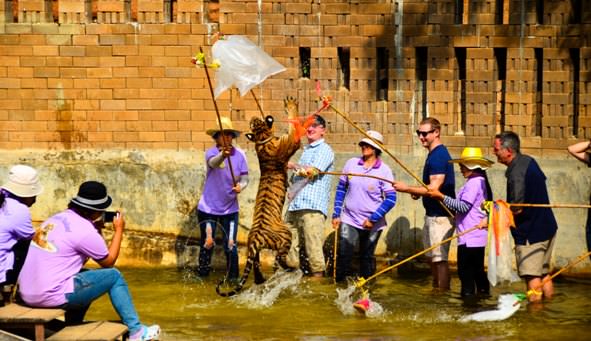
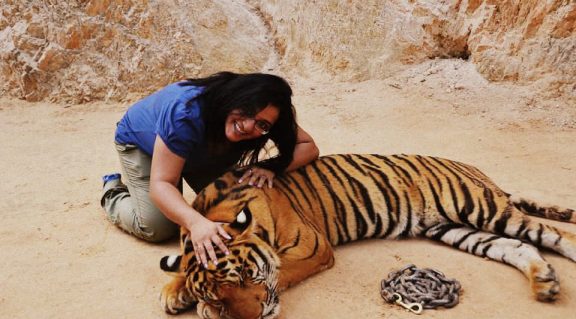

Amazing! Didn’t know about this place. Thanks for the enlightenment!
My Pleasure Neha ..:)..:P
Seems so amazing out of this world. I can never imagine tigers as tame, indifferent yes, as they ignore the jeeps. But this is incredible.
Totally amazing!!.. esp. seeing the monks play with them fearlessly
Ekta, you are very brave. Interesting place.
Thanks Saru….initially even I was bit scared…but the volunteers are good and they guide you well.
I would really like to play with tigers, I’ve heard rumors though that they sell some of the babies to the illegal tiger trade… such a shame if true!
I am not sure about that… but the place seemed nice. Some of the tigers were a little drowsy and we doubted if it was just the sun that made them soo lazy.
Stunning photography, amazing place
Thanks !!
this is so amazing … forget tigers i freak out if there is a cat near by 🙁
Amazing………Nice photos………..As you like to travel, you can try http://www.mygreatstay.com which gives you detailed information on homestays and sightseeing places across India